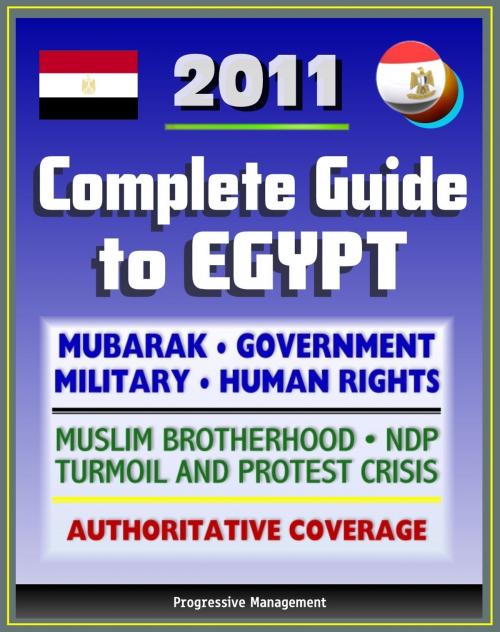2011 Complete Guide to Egypt: Mubarak, Government and Politics, NDP, Military, Muslim Brotherhood, Human Rights, History, Economy, American Response to Protest Crisis - Authoritative Coverage
Nonfiction, Social & Cultural Studies, Political Science, International| Author: | Progressive Management | ISBN: | 9781458055620 |
| Publisher: | Progressive Management | Publication: | January 28, 2011 |
| Imprint: | Smashwords Edition | Language: | English |
| Author: | Progressive Management |
| ISBN: | 9781458055620 |
| Publisher: | Progressive Management |
| Publication: | January 28, 2011 |
| Imprint: | Smashwords Edition |
| Language: | English |
This massive compilation provides a complete picture of Egypt as it confronts the protests of 2011. Over 500 pages of up-to-date information with professional analysis and background data about Egyptian politics, the rule of Hosni Mubarak, the rise of the Muslim Brotherhood, NDP, opposition parties, human rights, economics, military and national security, U.S. aid, energy, agriculture, history, travel information, and much more. The U.S. response to the January 2011 protests and turmoil is included; extensive histories put the current situation into perspective. There is material from many agencies of the American government, including the experts at the Federal Research Division. Egypt country background data provides data on key parameters, people and history, industry, natural resources, U.S.- Egyptian relations, travel and business information, and more. The Library of Congress Federal Research Division Country Study is an exceptional review of Egypt and its history, backed up by an extensive bibliography. Books in the Country Studies series describe and analyze "political, economic, social, and national security systems and institutions, and examin[e] the interrelationships of those systems and the ways they are shaped by cultural factors. The authors seek to provide a basic understanding of the observed society, striving for a dynamic rather than a static portrayal. Particular attention is devoted to the people who make up the society, their origins, dominant beliefs and values, their common interests and the issues on which they are divided, the nature and extent of their involvement with national institutions, and their attitudes toward each other and toward their social system and political order." Contents range from Ancient Egypt and the era of Muhammad Ali through modern times: The Rise and Decline of the Wafd, 1924-39, Egypt During the War, 1939-45, Camp David and the Assassination of Sadat, Mubarak and the Middle Way, Physical Size and Borders, Natural Regions, Nile Valley and Delta, Western Desert, Eastern Desert, Sinai Peninsula, Climate, Population, Population Control Policies, Major Cities, Emigration, Minorities, Social Organization, Urban Society, Rural Society, Family and Kinship, Importance of Kinship, Attitudes Toward Women, Changing Status of Women, Religion, Islam, Early Developments, Contemporary Islam, Islamic Political Movements, Coptic Church, Other Religious Minorities, Education, Health and Welfare, Chapter 3 - Economy Infrastructure, Transportation, Communications, Role of Government, Mubarak's Gradualism?, Development Planning, Pricing and Subsidy, Exchange Rates, Public Finance, Banking, Credit, and Inflation, Labor, Employment, Wages, Agriculture, The Food Gap, Land Ownership and Reform, Land Reclamation and Loss, Pricing Policy, Cropping Patterns, Production, and Yield, Technology, Energy, Mining, and Manufacturing, Energy, Mining, Manufacturing, Foreign Trade, Exports, Imports, Trade Partners, Balance of Payments and Main Sources of Foreign Exchange, Petroleum, Suez Canal, Remittances, Tourism, Current Account Balance, Capital Account and Capital Grants, Direct Foreign Investment, Loans, Debt and Restructuring, Chapter 4 - The Dominant Executive and Power Elite, Presidency, President and Power Elite, The Prime Minister, the Council of Ministers, and the Policy-making Process, The Road to Power: Recruitment and Composition of the Elite, Elite Ideology, Politics among Elites, Military Politics, The Politics of Economic Strategy, The Bureaucracy and Policy Implementation, Local Government, Subordinate Branches: The Political Role of the Media, Interest Groups, Controlling the Mass Political Arena, The "Dominant Party System", The Ruling Party, The Opposition Parties, Elections, more. This is a privately authored news service and educational publication of Progressive Management.
This massive compilation provides a complete picture of Egypt as it confronts the protests of 2011. Over 500 pages of up-to-date information with professional analysis and background data about Egyptian politics, the rule of Hosni Mubarak, the rise of the Muslim Brotherhood, NDP, opposition parties, human rights, economics, military and national security, U.S. aid, energy, agriculture, history, travel information, and much more. The U.S. response to the January 2011 protests and turmoil is included; extensive histories put the current situation into perspective. There is material from many agencies of the American government, including the experts at the Federal Research Division. Egypt country background data provides data on key parameters, people and history, industry, natural resources, U.S.- Egyptian relations, travel and business information, and more. The Library of Congress Federal Research Division Country Study is an exceptional review of Egypt and its history, backed up by an extensive bibliography. Books in the Country Studies series describe and analyze "political, economic, social, and national security systems and institutions, and examin[e] the interrelationships of those systems and the ways they are shaped by cultural factors. The authors seek to provide a basic understanding of the observed society, striving for a dynamic rather than a static portrayal. Particular attention is devoted to the people who make up the society, their origins, dominant beliefs and values, their common interests and the issues on which they are divided, the nature and extent of their involvement with national institutions, and their attitudes toward each other and toward their social system and political order." Contents range from Ancient Egypt and the era of Muhammad Ali through modern times: The Rise and Decline of the Wafd, 1924-39, Egypt During the War, 1939-45, Camp David and the Assassination of Sadat, Mubarak and the Middle Way, Physical Size and Borders, Natural Regions, Nile Valley and Delta, Western Desert, Eastern Desert, Sinai Peninsula, Climate, Population, Population Control Policies, Major Cities, Emigration, Minorities, Social Organization, Urban Society, Rural Society, Family and Kinship, Importance of Kinship, Attitudes Toward Women, Changing Status of Women, Religion, Islam, Early Developments, Contemporary Islam, Islamic Political Movements, Coptic Church, Other Religious Minorities, Education, Health and Welfare, Chapter 3 - Economy Infrastructure, Transportation, Communications, Role of Government, Mubarak's Gradualism?, Development Planning, Pricing and Subsidy, Exchange Rates, Public Finance, Banking, Credit, and Inflation, Labor, Employment, Wages, Agriculture, The Food Gap, Land Ownership and Reform, Land Reclamation and Loss, Pricing Policy, Cropping Patterns, Production, and Yield, Technology, Energy, Mining, and Manufacturing, Energy, Mining, Manufacturing, Foreign Trade, Exports, Imports, Trade Partners, Balance of Payments and Main Sources of Foreign Exchange, Petroleum, Suez Canal, Remittances, Tourism, Current Account Balance, Capital Account and Capital Grants, Direct Foreign Investment, Loans, Debt and Restructuring, Chapter 4 - The Dominant Executive and Power Elite, Presidency, President and Power Elite, The Prime Minister, the Council of Ministers, and the Policy-making Process, The Road to Power: Recruitment and Composition of the Elite, Elite Ideology, Politics among Elites, Military Politics, The Politics of Economic Strategy, The Bureaucracy and Policy Implementation, Local Government, Subordinate Branches: The Political Role of the Media, Interest Groups, Controlling the Mass Political Arena, The "Dominant Party System", The Ruling Party, The Opposition Parties, Elections, more. This is a privately authored news service and educational publication of Progressive Management.















